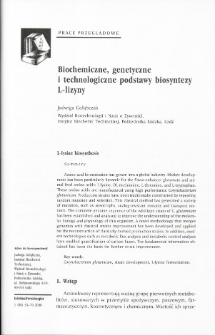
Obiekt
Tytuł: Biochemiczne, genetyczne i technologiczne podstawy biosyntezy L-lizyny
Inny tytuł:
Wydawca:
Komitet Biotechnologii PAN ; Instytut Chemii Bioorganicznej PAN
Abstrakt:
Amino acid fermentation has grown into a global industry. Market development has been particularly dynamic for the flavor-enhancer glutamate and animal feed amino acids: L-lysine, DL-methionine, L-threonine, and L-tryptophan. These amino acids are manufactured using high performance Corynebacterium glutamicum. Production strains have been traditionally constructed by repeating random mutation and selection. This classical method has generated a variety of mutation, such as auxotrophs, analog-resistant mutants and transport mutants. The complete genome sequence of the wild-type strain of C. glutamicum has been established and analysed to improve the understending of the molecular biology and physiology of this organism. A novel methodology that merges genomics with classical strains improvement has been developed and applied for the reconstruction of classicaly derived production strains. In addition, modern technologies such as metabolic flux analysis and metabolic control analysis have enabled quantification of carbon fluxes. The fundamental information obtained has been the basis for further strain improvement.
Czasopismo/Seria/cykl:
Biotechnologia, vol.80, 1 (2008)-.
Tom:
Zeszyt:
Strona pocz.:
Strona końc.:
Szczegółowy typ zasobu:
Format:
Identyfikator zasobu:
0860-7796 ; oai:rcin.org.pl:74059
Źródło:
Biblioteka Instytutu Chemii Bioorganicznej PAN
Język:
Język streszczenia:
Zakres czasowy:
Prawa:
Licencja Creative Commons Uznanie autorstwa-Na tych samych warunkach 4.0
Zasady wykorzystania:
Digitalizacja:
Instytut Chemii Bioorganiczneji Polskiej Akademii Nauk
Lokalizacja oryginału:
Instytut Chemii Bioorganiczneji Polskiej Akademii Nauk
Dofinansowane ze środków:
Dostęp:
Kolekcje, do których przypisany jest obiekt:
Data ostatniej modyfikacji:
2 paź 2020
Data dodania obiektu:
1 lip 2019
Liczba pobrań / odtworzeń:
5922
Wszystkie dostępne wersje tego obiektu:
https://rcin.org.pl/ichb/publication/96916
Wyświetl opis w formacie RDF:
Wyświetl opis w formacie RDFa:
Wyświetl opis w formacie OAI-PMH:
| Nazwa wydania | Data |
|---|---|
| Biochemiczne, genetyczne i technologiczne podstawy biosyntezy L-lizyny | 2 paź 2020 |
Obiekty Podobne
Borkowska, Bożenna
Ziółkowski, Piotr Babula- Skowrońska, Danuta Kaczmarek, Małgorzata Cieśla, Agata Sadowski, Jan
Gołąbczak, Jadwiga Gendaszewska-Darmach, Edyta
Nowak, Jacek K.

 INSTYTUT ARCHEOLOGII I ETNOLOGII POLSKIEJ AKADEMII NAUK
INSTYTUT ARCHEOLOGII I ETNOLOGII POLSKIEJ AKADEMII NAUK
 INSTYTUT BADAŃ LITERACKICH POLSKIEJ AKADEMII NAUK
INSTYTUT BADAŃ LITERACKICH POLSKIEJ AKADEMII NAUK
 INSTYTUT BADAWCZY LEŚNICTWA
INSTYTUT BADAWCZY LEŚNICTWA
 INSTYTUT BIOLOGII DOŚWIADCZALNEJ IM. MARCELEGO NENCKIEGO POLSKIEJ AKADEMII NAUK
INSTYTUT BIOLOGII DOŚWIADCZALNEJ IM. MARCELEGO NENCKIEGO POLSKIEJ AKADEMII NAUK
 INSTYTUT BIOLOGII SSAKÓW POLSKIEJ AKADEMII NAUK
INSTYTUT BIOLOGII SSAKÓW POLSKIEJ AKADEMII NAUK
 INSTYTUT CHEMII FIZYCZNEJ PAN
INSTYTUT CHEMII FIZYCZNEJ PAN
 INSTYTUT CHEMII ORGANICZNEJ PAN
INSTYTUT CHEMII ORGANICZNEJ PAN
 INSTYTUT FILOZOFII I SOCJOLOGII PAN
INSTYTUT FILOZOFII I SOCJOLOGII PAN
 INSTYTUT GEOGRAFII I PRZESTRZENNEGO ZAGOSPODAROWANIA PAN
INSTYTUT GEOGRAFII I PRZESTRZENNEGO ZAGOSPODAROWANIA PAN
 INSTYTUT HISTORII im. TADEUSZA MANTEUFFLA POLSKIEJ AKADEMII NAUK
INSTYTUT HISTORII im. TADEUSZA MANTEUFFLA POLSKIEJ AKADEMII NAUK
 INSTYTUT JĘZYKA POLSKIEGO POLSKIEJ AKADEMII NAUK
INSTYTUT JĘZYKA POLSKIEGO POLSKIEJ AKADEMII NAUK
 INSTYTUT MATEMATYCZNY PAN
INSTYTUT MATEMATYCZNY PAN
 INSTYTUT MEDYCYNY DOŚWIADCZALNEJ I KLINICZNEJ IM.MIROSŁAWA MOSSAKOWSKIEGO POLSKIEJ AKADEMII NAUK
INSTYTUT MEDYCYNY DOŚWIADCZALNEJ I KLINICZNEJ IM.MIROSŁAWA MOSSAKOWSKIEGO POLSKIEJ AKADEMII NAUK
 INSTYTUT PODSTAWOWYCH PROBLEMÓW TECHNIKI PAN
INSTYTUT PODSTAWOWYCH PROBLEMÓW TECHNIKI PAN
 INSTYTUT SLAWISTYKI PAN
INSTYTUT SLAWISTYKI PAN
 SIEĆ BADAWCZA ŁUKASIEWICZ - INSTYTUT TECHNOLOGII MATERIAŁÓW ELEKTRONICZNYCH
SIEĆ BADAWCZA ŁUKASIEWICZ - INSTYTUT TECHNOLOGII MATERIAŁÓW ELEKTRONICZNYCH
 MUZEUM I INSTYTUT ZOOLOGII POLSKIEJ AKADEMII NAUK
MUZEUM I INSTYTUT ZOOLOGII POLSKIEJ AKADEMII NAUK
 INSTYTUT BADAŃ SYSTEMOWYCH PAN
INSTYTUT BADAŃ SYSTEMOWYCH PAN
 INSTYTUT BOTANIKI IM. WŁADYSŁAWA SZAFERA POLSKIEJ AKADEMII NAUK
INSTYTUT BOTANIKI IM. WŁADYSŁAWA SZAFERA POLSKIEJ AKADEMII NAUK
































